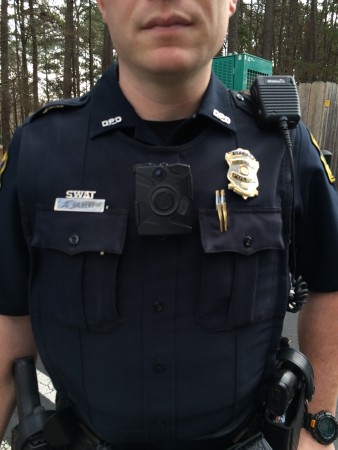Some police officers’ dashboard cameras start recording when the blue lights begin flashing. Soon, additional cameras may begin recording interactions between police officers and residents in Atlanta and Dunwoody.
In about three months, local police officials say, officers in those two local communities will start wearing cameras mounted on their uniforms. Brookhaven police also are looking into using body cameras and say they are currently testing different models. And a state lawmaker has introduced proposed legislation requiring all police officers to wear the cameras.
The national controversy arising from police-involved deaths in Ferguson, Mo., and New York City have left both police officers and their critics calling for more objective evidence of behavior during confrontations between officers and residents. Body-mounted cameras have been promoted as one possible solution.
Atlanta’s Deputy Chief C.J. Davis said the on-body cameras, which are expected to cost millions of dollars for equipment and storage, are worth the expense. Both officers and citizens behave better when they know someone is watching. “People have a tendency to alter their behavior in a positive way when they know they’re being recorded,” Davis said.
But not every local agency agrees with the use of cameras mounted on officers. Sandy Springs says no to on-body cameras, at least for now, department spokesman Capt. Steve Rose said.
“The privacy issues are a huge consideration by those whose agenda calls for mandating body cameras,” Rose said. “What is recorded—and imagine how graphic that could be in the case of a fatal car wreck, homicide or other shooting, or even a rape case—would be potentially exposed to public view on YouTube or other Internet means.”
Davis said Atlanta is investing in on-body cameras because studies show that having video testimony reduces the time needed for officers to appear in court. Complaints against officers dropped in areas where on-body cameras were tested, Davis said, citing a study done in Rialto, Calif.
She believes the new technology will provide “clarity as to what really happened,” in situations where it’s just an officer’s word against a citizen’s, she said.
“Even the dash cams don’t pick up conversation,” Davis said. “Instead of describing slurred speech, video will show it. It’s an excellent way to document the interaction.”
Brookhaven police Maj. Brandon Gurley said new technology such as body cameras strengthens the relationship between the police and the community, and sends a message that officials are being as transparent as possible.
Though part of the reasoning behind using the cameras is to protect the police against unwarranted complaints, Dunwoody Police Chief Billy Grogan said it also is important to recognize the technology’s limitations.
“Even with the use of on-body cameras, the entire scope of what happened in any police encounter may not be captured by the video due to the direction the camera is facing or what happens to the camera during the encounter,” Grogan said. “In other words, these cameras may not capture every aspect of the encounter that happens or that an officer sees.”
Grogan said no complaints about excessive force were filed against Dunwoody police officers in 2013 or 2014.
Of more than 2,400 arrests made in 2014, the police department received only 19 complaints about things like officers “being rude,” Grogan said. He admitted that the number of complaints in 2014 was more than double that of 2013, when eight complaints were logged, and he said he isn’t sure why. “We changed forms at the beginning of this year, so maybe we are doing a better job of documenting the complaints,” Grogan said.
Body-worn cameras will be on patrol officers in Dunwoody within the first quarter of the year as City Council members approved $30,000 in the 2015 budget for 37 body-worn cameras and storage fees, Grogan said. Now, he said he needs to work with city staff and other advisers to define and set the police department’s policy in using the cameras.
“You want to train officers on policy,” Grogan said. “”You push a button to work the camera, but policy concerns when to record, how to classify video and how to upload video.”
Grogan noted that Georgia law currently prohibits video recording in a place where there is an expectation of privacy. He said shows like “COPS” have had to deal with lawsuits and change the way they operate in Georgia because of the law.
The Sandy Springs Police Department tested a few models of on-body cameras sent by manufacturers about three years ago, Rose said. He said that decision not to move forward came from Chief Ken DeSimone, who cites privacy problems that his policy would have to take into consideration.
Body-mounted cameras “won’t be the magic bullet to solve all issues of police complaints,” Rose said. Though a camera may provide additional evidence, a two-dimensional camera may not be enough, he said.
“To assume guilt or even innocence based only on camera footage would be a convenient method of ‘Monday Morning Quarterbacking,’” Rose said. “So, in the real world aftermath of a shooting, for instance, would the camera footage provide an almost irresistible temptation for critics to play the could-have-should-have game?”
Gurley said much more thought will go into creating policy than in deciding what model camera to use, if Brookhaven decides to use on-body cameras. He said Brookhaven police are consulting with the district attorney and the Georgia Association of Chiefs of Police to make a decision.
“Part of our job is to conduct ourselves in a way that has legitimacy in the community, so people know we are doing our jobs like we should,” Grogan said.


Put cameras on criminals not Police .